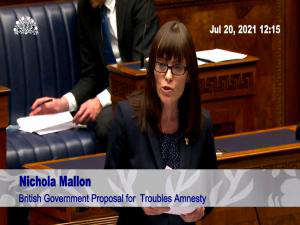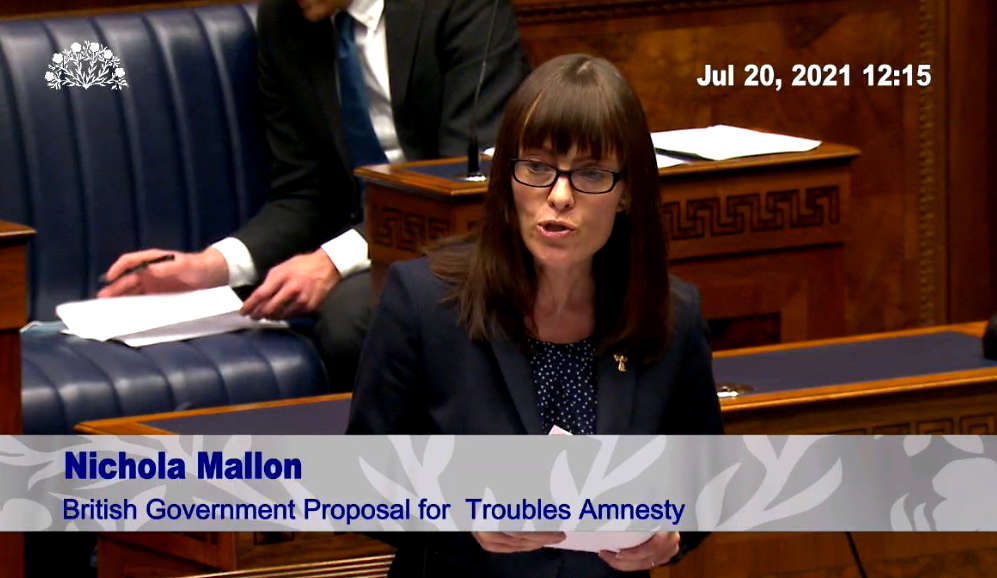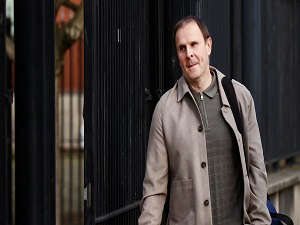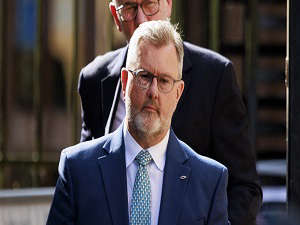
By David Young, Jonathan McCambridge and Rebecca Black, PA
A proposed ban on Troubles prosecutions would not be acceptable in any other modern democracy in the world, the Stormont Assembly has been told.
MLAs returned from summer recess on Tuesday for an emergency sitting to debate the Government’s controversial plan to introduce a statute of limitations on crimes committed during the Northern Ireland conflict.
SDLP deputy leader Nichola Mallon tabled a motion calling on all Stormont parties to unite in opposition to the proposals outlined by Northern Ireland Secretary Brandon Lewis last week.
Opening the debate, Ms Mallon accused the Government of attempting to sweep victims’ pain under the carpet.
She said the proposals would let “perpetrators – state and paramilitary – walk free and instead condemn the victims and their families to a lifetime of pain and suffering through the denial of hope, truth and justice”.
Ms Mallon branded the proposals a “unilateral move” by the UK Government to deliver a “Tory party answer to a problem created by that same party and its backbench MPs”.
“Backbenchers who have created a bogus myth that an endless parade of veterans are being dragged through the courts here to answer for their past. When the fact is that is not true,” she said.
“Rather than debunk the myth and deal in facts, Boris Johnson and Brandon Lewis have decided to cruelly abandon victims and survivors as they play to the gallery.”
As the debate took place in Belfast, some victims of terrorism gathered in London with a plan to travel to Downing Street to hand over a letter indicating their opposition to what has been described as a de facto amnesty.
🎥 Victims campaigner Raymond McCord will lead the delegation at Downing Street this afternoon against the government’s legacy proposals.
— Q Radio News (@qnewsdesk) July 20, 2021
His son Raymond Jr was killed by the UVF in 1997.
They’ll deliver a letter to Boris Johnson calling on him to withdraw the plans. pic.twitter.com/PXuerUuBhP
🎥 Billy McManus will be at Downing Street this afternoon to protest against the government’s controversial plans for dealing with legacy cases.
— Q Radio News (@qnewsdesk) July 20, 2021
His father William was one of five people killed by the UDA in the 1992 Sean Graham bookies massacre in Belfast: pic.twitter.com/qAUE7AHwGC
Mr Lewis announced last week that he intends to introduce legislation to create a proposed statute of limitations which would end all prosecutions for incidents up to April 1998 and would apply to military veterans as well as ex-paramilitaries.
The proposals, which Prime Minister Boris Johnson said would allow Northern Ireland to “draw a line under the Troubles”, would also end all legacy inquests and civil actions related to the conflict.
But the plan has been heavily criticised by all the main political parties in Northern Ireland as well as the Irish Government, and a range of victims’ and survivors’ groups.
Ms Mallon said the amnesty proposal had devastated and retraumatised survivors and bereaved families.
“It hasn’t drawn a line. It has made the situation worse,” she said.
The Stormont minister added: “No one here wants to return to the past. Certainly no one wants to relive the destruction of those dark days. But for the victims and survivors of the Troubles, that is not a choice they have. Every day, they live with the horrific pain of the past.
“Yet this British Government, in doing this, is telling families that their loved one’s life didn’t matter, that their lives, their families’ loss isn’t worthy enough to be properly investigated in a process with integrity.
“It is disgusting and, Mr Speaker, it would not be acceptable in any other modern democracy in the world – and it cannot, and must not, be deemed acceptable here.”
Ms Mallon said victims were “realistic” about the chances of successful prosecutions over decades-old crimes.

Deputy leader of SDLP Nichola Mallon speaking in the assembly chamber this afternoon
“They know no-one can honestly promise justice to them,” she told MLAs.
“But no-one morally can or should be allowed to deny them justice; to extinguish the hope they are entitled to have.”
Ms Mallon urged all Stormont parties to unite in their opposition to the amnesty and work together to develop an agreed way forward on dealing with the past.
She said a failure to do so in recent years had created the opportunity for the UK Government to step in and propose the statute of limitations.
Ms Mallon urged parties to recommit to the stalled 2014 Stormont House Agreement proposals, which included an independent investigations unit.
“This move by the British Government has to be a wake-up call, we should never have needed this wake-up call, but we now need to act before it is too late,” she said.
Victims campaigners with the group Time for Truth staged a protest outside Stormont ahead of its recall to debate controversial proposals to deal with the past put forward by Secretary of State Brandon Lewis.
They handed a letter to deputy First Minister Michelle O’Neill asking her to block the legacy proposals which include stopping Troubles prosecutions.
I met & listened to the families of victims of British state murder today.
— Michelle O’Neill (@moneillsf) July 20, 2021
There can be no amnesty for those who murdered citizens on the streets of Ireland and for those who directed them.
Sinn Féin will continue to support the right of all families to access truth and justice pic.twitter.com/CIF3TcVcqU
Addressing the chamber, DUP MLA Mervyn Storey said victims “cannot and should not be ignored in this way”.
“The Secretary of State seems to have chosen a path which finds equivalence between the soldier and police officer, and those who planted the bomb or pulled the trigger,” he said.
“This is morally reprehensible.”
The DUP MLA also criticised Sinn Fein for accusing the UK Government of “covering up the truth”, highlighting that the IRA was responsible for the vast majority of Troubles crimes.
Sinn Fein deputy First Minister Michelle O’Neill said the proposals would deny bereaved families their rights.
“The British political system cannot handle the truth,” she said.
“The British Government fears the bravery, the courage and resilience of the families.”
Ms O’Neill added: “The legacy proposals to deny families any legal redress to justice is a statement of moral bankruptcy.
“The British Government approach is cynical because they’re seeking to insulate their forces from legal challenges by shutting down the established legal options that are open to families.
“Today we must send a very clear message that any political attempts to interfere in live and pending legal proceedings will be resisted by everyone across this House.”
Ulster Unionist Party leader Doug Beattie voiced opposition to any move toward an amnesty.
“We have been quite clear that the soldier, the policeman, a terrorist, a member of the public or a politician – if you break the law, then you should face the law,” he said.
“And everybody deserves the opportunity to get justice. It doesn’t mean they always will, but we cannot take away that hope.”
However, Mr Beattie also criticised the 2014 Stormont House legacy proposals, highlighting that they did not envisage a reinvestigation of crimes, other than murders.
Alliance Party leader Naomi Long said the legacy proposals were “neither victim-centred or victim-focused”.
“To the contrary, both the proposals and how they have spun out in the media before any victims groups were even aware they were coming have re-traumatised many families, compounded the hurt and sense of abandonment which they feel and has sought to rob them of any remaining hope they had that they might ever see justice for their loved ones,” she said.
Ms Long also queried “what kind of message” the legacy proposals send to those still engaged in terrorism and to their victims.
“The Secretary of State’s proposals are profoundly flawed and not grounded on the needs of victims’ families for truth and justice,” she said.
“In their current form they are incapable of delivering closure and reconciliation. Instead they risk undermining the rule of law and are a recipe for decades in the courts focusing on challenging and unacceptable interference in due legal process and practise rather than truth recovery and justice.”


 Woman assaulted while jogging in West Belfast
Woman assaulted while jogging in West Belfast
 Leading loyalist Winston Irvine sentenced to 30 months for firearms offences
Leading loyalist Winston Irvine sentenced to 30 months for firearms offences
 Rescue operation to free 40 cows after lorry overturns on motorway
Rescue operation to free 40 cows after lorry overturns on motorway
 New date set for trial of former DUP leader Jeffrey Donaldson and wife
New date set for trial of former DUP leader Jeffrey Donaldson and wife